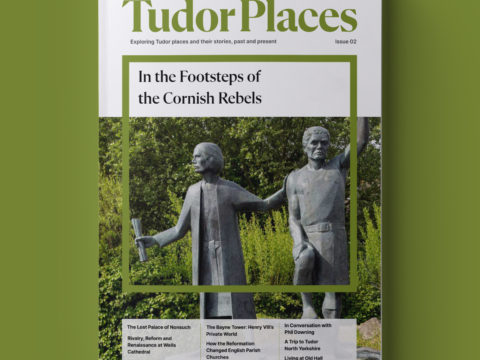James Melville: Life Story
Chapter 18 : Childhood of James VI
Melville seems to have taken a step back from public affairs at this point, although where he was, and how he passed is time, is unknown. Presumably, he was at Halhill with his wife, bringing up a young family.
He recounts how the young King, James, was brought up at Stirling by Lady Mar, and the Lord Erskine, neither of whom were friends to Morton. Morton was forced to resign in 1578 when James was twelve, but attempted to regain power in 1579. In 1580, he was publicly accused of murdering Darnley, and arrested. The English, displeased by the overthrow of their preferred Regent, made warlike noises, but James and his advisors (his cousin, Esme Stuart, Duke of Lennox, who was nephew of the assassinated Regent Lennox, and Lord James Stewart, Earl of Arran) raised taxation for an army, and the English retreated – not so enamoured of Morton that they wished to go to war.
The young King’s favouring of Lennox and Arran was not popular with his other lords, and a scheme was hatched to deal with them. Lennox had converted to the Presbyterian faith that was now the official religion of Scotland, but his conversion was considered suspect.
In 1582, Melville reappears at the forefront of affairs. He had been appointed a Justice in Ayre in West Lothian. One morning, an unknown man came into his bedroom with a story of a plot against Lennox, Arran and the King. Melville warned Lennox, but it was too late. James had been captured and was being held at Stirling Castle by a group who became known as the Lords Enterprisers.
Both Queen Elizabeth and King Henri III of France sent messages to James, assuring him they would help him escape, but James, aged sixteen, was too wise to fall into the trap of accepting foreign aid. He was very happy in the care of his subjects, he said, who had mistakenly thought ill of the Duke of Lennox and Earl of Arran.
James, however, was just biding his time. He called a meeting of his nobles at St Andrew’s, ostensibly to hear the report of two ambassadors he had sent to England. He summoned to it all of the Lords who had not been involved in his detention, including Melville. Melville was loath to attend – he was tired of public life, and the strife and factions he had seen in his many years of service, and had hoped to continue a quiet life in retirement. He was now in his late forties – not considered very old by the standards of the day, but certainly not young.
However, duty called, and he trundled off to James at Falkland, where he listened to James complaining about how badly he had been treated. Melville pointed out that minorities were always difficult times, with factions and self-seeking abounding but that the best thing for a King to do on attaining his majority, was to forget the past. James, not entirely taking Melville’s advice, rode on to St Andrew’s having made a proclamation that only such lords as he had sent for should meet him there. Melville was angry, believing that the Lords Enterprisers would ignore the orders and come to St Andrew’s quicker than the ones sent for. His misgivings were proven correct as uninvited lords and their retinues turned up.
James however, persuaded them that he would let bygones be bygones, and that he bore no grudge for his imprisonment. He then called Melville up before the whole court, and praised him for his good advice –much to Melville’s embarrassment, and also annoyance, as he was already disliked for having given the King warning of the plot against him.
In due course, James’ friend, the Earl of Arran, petitioned to be allowed back to court. James asked Melville’s advice and received the answer that for him to hide the truth would imperil James, but to tell it would imperil Melville. On being asked to explain, Melville told James that Arran was a trouble maker, and that if he were returned to favour, factions would break out again. If Arran found out that he had advised James against returning him to favour, Melville’s life would be endangered.
James decided that Arran should be allowed back to court once, so that his other lords could see that Arran should be well-treated, but that Arran should then retire. Arran, however, refused to leave and soon regained the King’s ear. In Melville’s opinion, things went from bad to worse as Arran prevented the King from hearing other advice.
Melville was not the only one to advise James to be rid of Arran. Elizabeth wrote, reprimanding him for going back on his promise to treat all his lords equally. Melville was deputed to draft an answer, which was along the lines of telling Elizabeth to mind her own business.
Arran now had considerable influence, and, as Melville had predicted, wanted to get him out of the way. He suggested that Melville be sent on an embassy to England. Melville was summoned to Stirling, where he handed the King a long letter, full of advice on good governance. On being told of the plan to send him to England, Melville told the King that the English would never respect James and consider him as the heir to the English Crown until he had got his own house in order, and that it was not the right time for an embassy. James accepted the advice and allowed Melville to return home.






